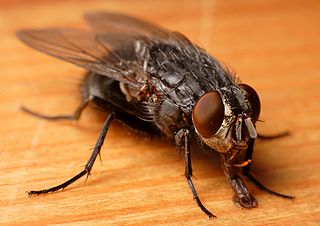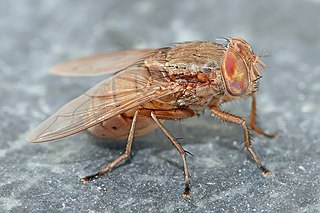
The family Sciomyzidae belongs to the typical flies (Brachycera) of the order Diptera. They are commonly called marsh flies, and in some cases snail-killing flies due to the food of their larvae.

The Drosophilidae are a diverse, cosmopolitan family of flies, which includes species called fruit flies, although they are more accurately referred to as vinegar or pomace flies. Another distantly related family of flies, Tephritidae, are true fruit flies because they are frugivorous, and include apple maggot flies and many pests. The best known species of the Drosophilidae is Drosophila melanogaster, within the genus Drosophila, also called the "fruit fly." Drosophila melanogaster is used extensively for studies concerning genetics, development, physiology, ecology and behaviour. Many fundamental biological mechanisms were discovered first in D. melanogaster. The fruit fly is mostly composed of post-mitotic cells, has a very short lifespan, and shows gradual aging. As in other species, temperature influences the life history of the animal. Several genes have been identified that can be manipulated to extend the lifespan of these insects. Additionally, Drosophila subobscura, also within the genus Drosophila, has been reputed as a model organism for evolutionary-biological studies, along with D. sechellia for the evolution of host specialization on the toxic noni fruit and Scaptomyza flava for the evolution of herbivory and specialist on toxic mustard leaves.

Helina is a very large genus from the fly family Muscidae.

The Scathophagidae are a small family of Muscoidea which are often known as dung flies, although this name is not appropriate except for a few species of the genus Scathophaga which do indeed pass their larval stages in animal dung. The name probably derives from the yellow dung fly, which is one of the most abundant and ubiquitous flies in many parts of the Northern Hemisphere.

Calliphora is a genus of blow flies, also known as bottle flies, found in most parts of the world, with the highest diversity in Australia. The most widespread species in North America area Calliphora livida, C. vicina, and C. vomitoria.

The Lauxaniidae are a family of acalyptrate flies. They generally are small flies with large compound eyes that often are brightly coloured in life, sometimes with characteristic horizontal stripes, such as in Cestrotus species. Many species have variegated patterns on their wings, but in contrast they generally do not have variegated bodies, except for genera such as Cestrotus, whose camouflage mimics lichens or the texture of granitic rocks.

The Chamaemyiidae are a small family of acalyptrate flies with less than 200 species described worldwide. The larvae of these small flies are active and predatory and are often used for biological control of aphids, scale insects, and similar pests. Chamaemyiid fossils are poorly represented in amber deposits, but a few examples are known from the Eocene epoch onwards.

The Coelopidae or kelp flies are a family of Acalyptratae flies, they are sometimes also called seaweed flies, although both terms are used for a number of seashore Diptera. Fewer than 40 species occur worldwide. The family is found in temperate areas, with species occurring in the southern Afrotropical, Holarctic, and Australasian regions.

Bengalia is a genus of blow flies in the family Calliphoridae with one authority considering the genus to belong to a separate family Bengaliidae. These bristly and, unlike the greens and blues of most calliphorids, dull coloured flies, are especially noted for their relationship to ants. Little is known of their biology and life-cycle, although adults of many species are kleptoparasitic on ants and will snatch food and pupae being carried by ants or feed on winged termites. The apt name “Highwayman Fly” was given by an early observer of their way of robbing ants. Very little is known about their breeding habits. The genus is found in the Afrotropical and oriental region with one species from Australia possibly a recent introduction.

Trupanea is a genus of tephritid or fruit flies in the family Tephritidae.

Xanthaciura is a genus of tephritid or fruit flies in the family Tephritidae.

Actia is a genus of large flies in the family Tachinidae.

Empicoris is a cosmopolitan genus of thread-legged bug (Emesinae). Numerous species have been described.

The Metopininae are a subfamily of flies in the family Phoridae.
Melanomyza is a genus of flies in the family Lauxaniidae. There are about 12 described species in Melanomyza.

Xenochaetina is a genus of flies in the family Lauxaniidae. There are about 11 described species in Xenochaetina.
Galgupha is a genus of black bugs in the family Thyreocoridae. There are more than 30 described species in Galgupha.

Cordilura is a genus of dung flies in the family Scathophagidae. There are more than 90 described species in Cordilura.
Phyllomyza is a genus of freeloader flies in the family Milichiidae. There are at least 30 described species in Phyllomyza.
Beckerina is a genus of flies in the family Phoridae.















